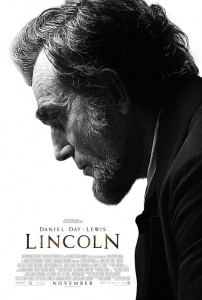
MPAA Rating: PG-13
Director: Steven Spielberg
There is a moment very near the beginning of Steven Spielberg’s Lincoln that made me literally roll my eyes. My disdain for Spielberg’s recent work is not a secret, and it’s mostly because of the overwrought, shoe-horned, out of place schmaltz he forces into his later works.
When it happened in Lincoln, I was immediately put on the defensive. I didn’t want this to go the way of War Horse (a film I could not sit through in its entirety), and I dreaded what was to follow.
Luckily, that moment was not indicative of the rest of the film. Despite a few moments that could have been left on the cutting room floor, Lincoln is a well-crafted, generally well-scripted and amazingly well-acted look at the nation’s 16th President.
Unlike many biopics, Lincoln decides to forgo looking at the life of the man and focus on a specific point in time – from his re-election in 1865 until the passing of the 13th amendment, which abolished slavery in the United States.
The key to the film’s success is the cast, headlined by Daniel Day-Lewis, who again disappears into a role as Lincoln himself. But he’s not alone. Sally Field, Tommy Lee Jones, David Straitharn and Hal Holbrook are the highlights, but Spielberg wisely cast dependable character actors for several of the smaller roles and the attention to lesser characters helps the film immensely.
The film plays out like a pseudo-documentary by way of stage play. It’s incredibly dialogue heavy, but its never boring. It’s to the actors’ and writer’s credit that the film loses little steam when the movie shifts its focus from Lincoln to other locales, the most prominent of which is the House of Representatives.
If the movie has flaws – and there are a few – they mostly concern the script. Tony Kushner (who also Munich) has written some incredibly articulate and wonderful dialogue where most of the script is concerned, but more than once he seems to shift tone and seems like he wants to deify Abraham Lincoln, painting him as this universally loved figure (which he was not at the time), and like with the aforementioned opening scene, trying too hard to instill flag-waving patriotic pride into the mix.
As this is a historic film, there will be debates about its accuracy. Scholars may have issues with some of the liberties the screenplay has taken with the facts (and supposed facts) of the era, especially when they are twisted to provide a false moment of inspiration.
As a film, though, it’s hard to fault. Janusz Kaminski’s photography is up to his standard excellence, John Williams’ score is serviceable, if not spectacular, and despite a few missteps, it’s a great exercise in how to make a dialogue-heavy historical epic.
Spielberg’s a veteran, after all, and he knows that sometimes, doing less is more. For Lincoln, that meant letting his actors do what they do best and stay out of their way.






